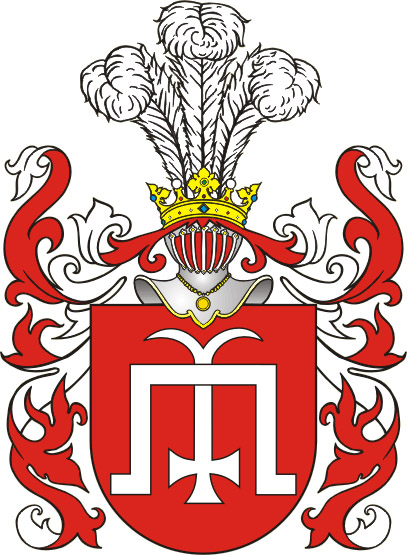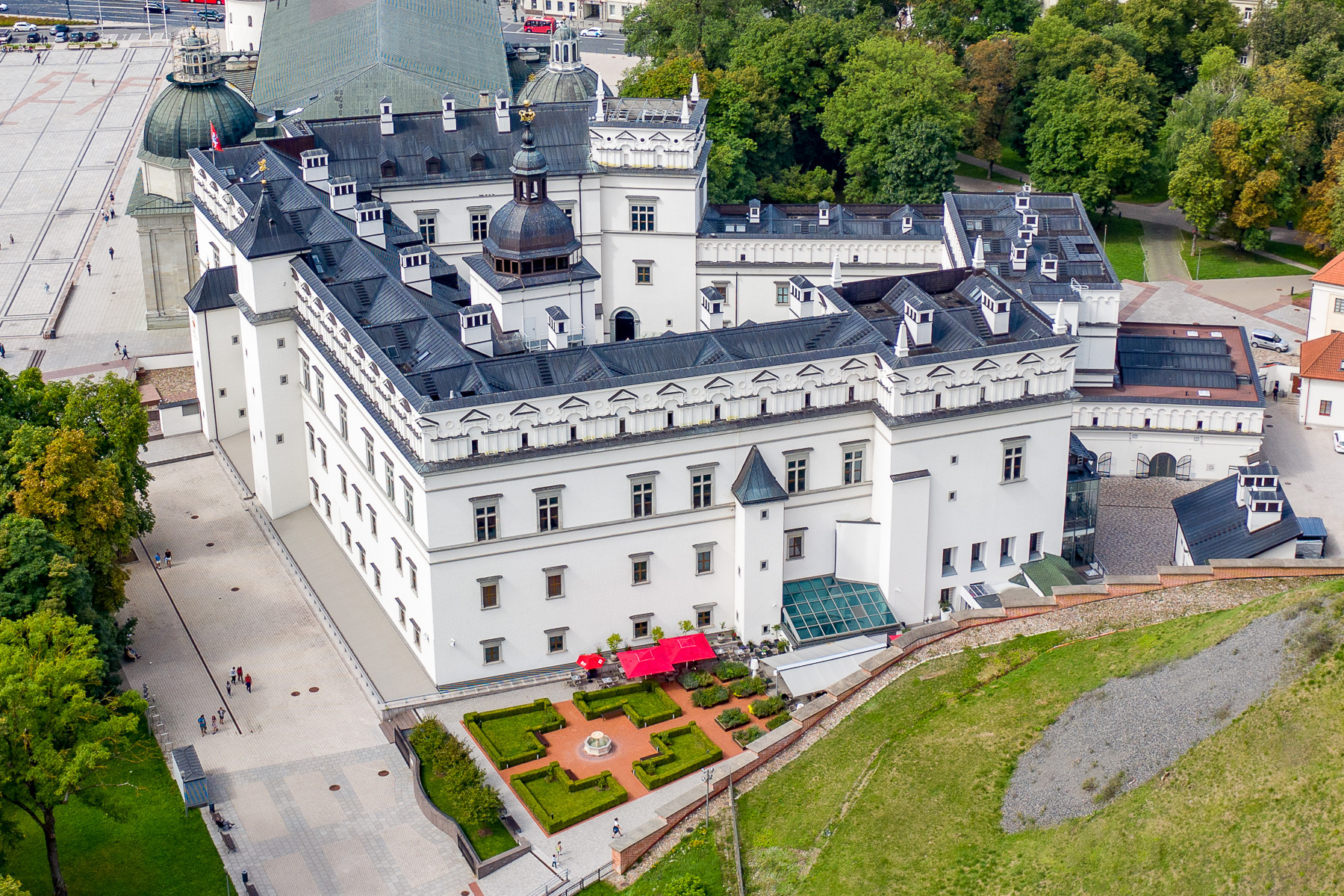|
Michał Gliński
Michael Lvovich Glinsky (; ; ; 1460s – 24 September 1534) was a noble from the Grand Duchy of Lithuania of distant Tatar extraction, who was also a tutor of his grand-nephew, Ivan the Terrible. Glinsky was born in Turov. He was a son of prince Lev Borisovich Glinsky (), and paternal uncle of Elena Glinskaya. As a young man, Glinsky served in the court of Emperor Maximilian I and earned distinction for his military service. Around 1498 he returned to Lithuania and quickly rose in power and wealth, angering local nobles. Just after commanding the victorious Battle of Kletsk against the Crimean Khanate in August 1506, he was accused of conspiracy against the deceased Grand Duke Alexander Jagiellon and lost all his wealth. Glinsky began an armed rebellion against Sigismund I, the new Grand Duke. The rebellion was unsuccessful and Glinsky retreated to the Grand Duchy of Moscow, where he served Vasili III of Russia. When the Muscovite–Lithuanian Wars renewed in 1512, Glinsky was i ... [...More Info...] [...Related Items...] OR: [Wikipedia] [Google] [Baidu] |
Herb Glinski
Herbs are a widely distributed and widespread group of plants, excluding vegetables, with savory or aromatic properties that are used for flavoring and garnishing food, for medicinal purposes, or for fragrances. Culinary use typically distinguishes herbs from spices. ''Herbs'' generally refers to the leafy green or flowering parts of a plant (either fresh or dried), while ''spices'' are usually dried and produced from other parts of the plant, including seeds, bark, roots and fruits. Herbs have a variety of uses including culinary, medicinal, aromatic and in some cases, spiritual. General usage of the term "herb" differs between culinary herbs and medicinal herbs; in medicinal or spiritual use, any parts of the plant might be considered "herbs", including leaves, roots, flowers, seeds, root bark, inner bark (and cambium), resin and pericarp. The word "herb" is pronounced in Commonwealth English, but is standard among American English speakers as well as those from regions whe ... [...More Info...] [...Related Items...] OR: [Wikipedia] [Google] [Baidu] |
Glinsky Family
The House of Glinski (Polish: Gliński) was an ancient Russian princely family, part of the Russian nobility, originted in the Grand Duchy of Lithuania, whose ancestors were members of the Lipka Tatar clan who claimed descent from the Mongol ruler Mamai.'' Трепавлов В. В.'' Предки «Мамая-царя». Киятские беки в «Подлинном родослове Глинских князей» // Тюркологический сборник 2006. — М.: Восточная литература, 2007. — С. 319—341. Surname Glinski, Glinskii, Glinsky, or Glinskiy (, , ), is also a family name. Feminine form: Russian: Glinskaya (Глинская), Polish: Glińska. Notable people * Anna Glinskaya (died 1553), Russian noble, mother of Elena Glinskaya *Elena Glinskaya (c. 1510–1538), Russian regent, daughter of Anna Glinskaya *Michael Glinski (died 1534), uncle of Tsar Ivan the Terrible *Mikhail Iosifovich Glinsky (1901–1991), Soviet Union ... [...More Info...] [...Related Items...] OR: [Wikipedia] [Google] [Baidu] |
Lithuanian Council Of Lords
The Lithuanian Council of Lords () was the main permanent institution of central government in the Grand Duchy of Lithuania active in its capital city of Vilnius. It had originated from the advisory Council of the Grand Duke, established by Vytautas the Great in the early 15th century. During the reign of Casimir Jagiellon it was renamed to the Council of Lords. Under the Union of Lublin of 1569, the Council formally became a constituent part of the Polish–Lithuanian Senates (see also Offices in the Polish-Lithuanian Commonwealth), together with the Royal Council of Poland, but it continued to operate ''de facto'' until the mid-17th century. Competence The Council carried out the functions of the Grand Duke after his death and had a supreme authority in the Grand Duchy of Lithuania until a new Grand Duke was appointed, as well as organised his appointment. The first appointed ruler was Casimir Jagiellon, who in exchange expanded the council's powers significantly and approved t ... [...More Info...] [...Related Items...] OR: [Wikipedia] [Google] [Baidu] |
Court Marshal Of Lithuania
A court is an institution, often a government entity, with the authority to adjudicate legal disputes between Party (law), parties and Administration of justice, administer justice in Civil law (common law), civil, Criminal law, criminal, and Administrative law, administrative matters in accordance with the rule of law. Courts generally consist of Judge, judges or other judicial officers, and are usually established and dissolved through legislation enacted by a legislature. Courts may also be established by constitution or an equivalent constituting instrument. The practical authority given to the court is known as its jurisdiction, which describes the court's power to decide certain kinds of questions, or Petition, petitions put to it. There are various kinds of courts, including trial courts, appellate courts, administrative courts, international courts, and tribunals. Description A court is any person or institution, often as a government institution, with the authori ... [...More Info...] [...Related Items...] OR: [Wikipedia] [Google] [Baidu] |
Utena, Lithuania
Utena () is a city in north-east Lithuania. It is the administrative center of Utena district and Utena County. Utena is one of the oldest settlements of Lithuania. The name of the city is most probably derived from a hydronym. The name of the settlement has been known since 1261. Utena is an industrial city. It is known for its clothing, food and beverage factories. In recent years, however, streets, public squares and large areas of the parks in the city were reconstructed and Utena is now more attractive for recreation and tourism. The anniversary of Utena City had been held each year on the last weekend of September. Since 2013 the anniversary has been held on the first weekend of September to take advantage of better weather conditions. History Utena was first mentioned in historical documents dating back to 1261. The settlement was a major center of Nalšia. It was part of the Grand Duchy of Lithuania until 1795, when it fell under the Russian Empire rule. From 1 ... [...More Info...] [...Related Items...] OR: [Wikipedia] [Google] [Baidu] |
Grand Duke Of Lithuania
This is a list of Lithuanian monarchs who ruled Lithuania from its inception until the fall of the Grand Duchy of Lithuania in 1795. The Lithuanian monarch bore the title of Grand duke, Grand Duke, with the exception of Mindaugas, who was crowned king in 1253. Other Lithuanian rulers, such as Vytautas the Great, also attempted to secure a royal coronation, but these efforts were unsuccessful.Nadveckė, Ineta (6 July 2019Trys Lietuvos karaliai: vienas tikras, vienas nelabai ir vienas beveik''Lithuanian National Radio and Television, LRT''. Until 1569, the Lithuanian monarchy was hereditary. In 1386, Grand Duke Jogaila was elected King of Poland. From that point onward, with some interruptions, the two states were united in a personal union, sharing a common ruler until 1569, when they were formally merged by the Union of Lublin to form the Polish–Lithuanian Commonwealth. The monarch of this new state was elected in a free election by the entire nobility. From the Christianizat ... [...More Info...] [...Related Items...] OR: [Wikipedia] [Google] [Baidu] |
University Of Bologna
The University of Bologna (, abbreviated Unibo) is a Public university, public research university in Bologna, Italy. Teaching began around 1088, with the university becoming organised as guilds of students () by the late 12th century. It is the List of oldest universities in continuous operation, oldest university in continuous operation in the world, and the first degree-awarding institution of higher learning.Hunt Janin: "The university in medieval life, 1179–1499", McFarland, 2008, , p. 55f.de Ridder-Symoens, Hilde''A History of the University in Europe: Volume 1, Universities in the Middle Ages'' Cambridge University Press, 1992, , pp. 47–55 The university's emblem carries the motto, ''Alma Mater Studiorum'' ("Nourishing mother of studies"), and the date ''A.D. 1088''. With over 90,000 students, the University of Bologna is one of the List of largest universities by enrollment, largest universities in Europe. The university saw the first woman to earn a university degree ... [...More Info...] [...Related Items...] OR: [Wikipedia] [Google] [Baidu] |
Roman Catholicism
The Catholic Church (), also known as the Roman Catholic Church, is the List of Christian denominations by number of members, largest Christian church, with 1.27 to 1.41 billion baptized Catholics Catholic Church by country, worldwide as of 2025. It is among the world's oldest and largest international institutions and has played a prominent role in the history and development of Western civilization.Gerald O'Collins, O'Collins, p. v (preface). The church consists of 24 Catholic particular churches and liturgical rites#Churches, ''sui iuris'' (autonomous) churches, including the Latin Church and 23 Eastern Catholic Churches, which comprise almost 3,500 dioceses and Eparchy, eparchies List of Catholic dioceses (structured view), around the world, each overseen by one or more Bishops in the Catholic Church, bishops. The pope, who is the bishop of Rome, is the Papal supremacy, chief pastor of the church. The core beliefs of Catholicism are found in the Nicene Creed. The ... [...More Info...] [...Related Items...] OR: [Wikipedia] [Google] [Baidu] |
Italian Wars
The Italian Wars were a series of conflicts fought between 1494 and 1559, mostly in the Italian Peninsula, but later expanding into Flanders, the Rhineland and Mediterranean Sea. The primary belligerents were the House of Valois, Valois kings of Kingdom of France, France, on one side, and their opponents in the Holy Roman Empire and Habsburg Spain, Spain on the other. At different points, various Italian states participated in the war, some on both sides, with limited involvement from Kingdom of England, England, Switzerland, and the Ottoman Empire. The Italic League established in 1454 achieved a Balance of power (international relations), balance of power in Italy, but fell apart after the death of its chief architect, Lorenzo de' Medici, in 1492. Combined with the ambition of Ludovico Sforza, its collapse allowed Charles VIII of France to invade Kingdom of Naples, Naples in 1494, which drew in Spain and the Holy Roman Empire. Although Charles was forced to withdraw in 1495, o ... [...More Info...] [...Related Items...] OR: [Wikipedia] [Google] [Baidu] |
Albert III, Duke Of Saxony
Albert III () (27 January 144312 September 1500) was a Duke of Saxony. He was nicknamed Albert the Bold or Albert the Courageous and founded the ''Albertine line'' of the House of Wettin. Biography Albert was born in Grimma as the third and youngest son (but fifth child in order of birth) of Frederick II the Gentle, Elector of Saxony, and Margarete of Austria, sister of Frederick III, Holy Roman Emperor. Later, he was a member of the Order of the Golden Fleece. After escaping from the hands of Kunz von Kaufungen, who had abducted him together with his brother Ernest, he spent some time at the court of the emperor Frederick III in Vienna. Endnote: See *F. A. von Langenn, ''Herzog Albrecht der Beherzte, Stammvater des königlichen Hauses Sachsen'' (Leipzig, 1838) *O. Sperling, ''Herzog Albrecht der Beherzte von Sachsen als Gubernator Frieslands'' (Leipzig, 1892). In Eger (Cheb) on 11 November 1464 Albert married Zdenka (Sidonie), daughter of George of Podebrady, King of B ... [...More Info...] [...Related Items...] OR: [Wikipedia] [Google] [Baidu] |
Order Of The Golden Fleece
The Distinguished Order of the Golden Fleece (, ) is a Catholic order of chivalry founded in 1430 in Brugge by Philip the Good, Duke of Burgundy, to celebrate his marriage to Isabella of Portugal, Duchess of Burgundy, Isabella of Portugal. Today, two branches of the order exist, namely the Spanish Fleece and the Austrian Fleece; the current grand masters are Felipe VI, King Felipe VI of Spain and Karl von Habsburg, head of the House of Habsburg-Lorraine, respectively. The Grand Chaplain of the Austrian branch is Cardinal Christoph Schönborn, Archbishop of Vienna. The separation of the two existing branches took place as a result of the War of the Spanish Succession of 1701–1714. The grand master of the order, Charles II of Spain (a House of Habsburg , Habsburg), had died childless in 1700, and so the right to succeed to the throne of Spain (and thus to become the Sovereign of the Order of the Golden Fleece) initiated a global conflict. On one hand, Charles VI, Holy Roman ... [...More Info...] [...Related Items...] OR: [Wikipedia] [Google] [Baidu] |
Friesland
Friesland ( ; ; official ), historically and traditionally known as Frisia (), named after the Frisians, is a Provinces of the Netherlands, province of the Netherlands located in the country's northern part. It is situated west of Groningen (province), Groningen, northwest of Drenthe and Overijssel, north of Flevoland, northeast of North Holland, and south of the Wadden Sea. As of January 2023, the province had a population of about 660,000, and a total area of . The province is divided into 18 municipalities. The Capital city, capital and seat of the provincial government is the city of Leeuwarden (West Frisian: ''Ljouwert'', Liwwaddes: ''Liwwadde''), a city with 123,107 inhabitants. Other large municipalities in Friesland are Sneek (pop. 33,512), Heerenveen (pop. 50,257), and Smallingerland (includes town of Drachten, pop. 55,938). Since 2017, Arno Brok is the King's Commissioner in the province. A coalition of the Christian Democratic Appeal, the People's Party for Freedom a ... [...More Info...] [...Related Items...] OR: [Wikipedia] [Google] [Baidu] |






